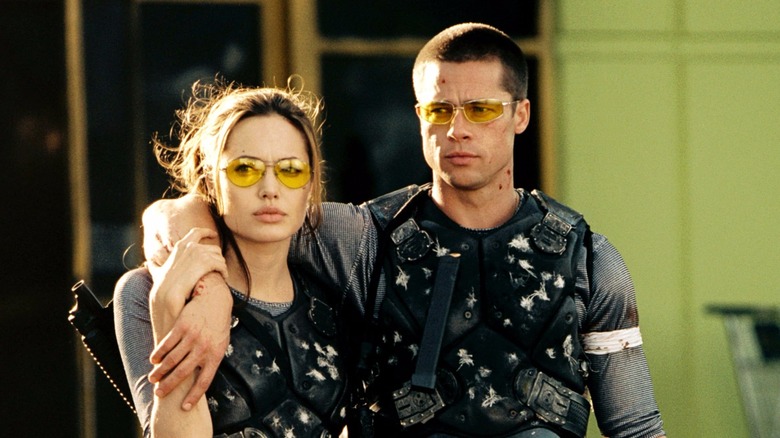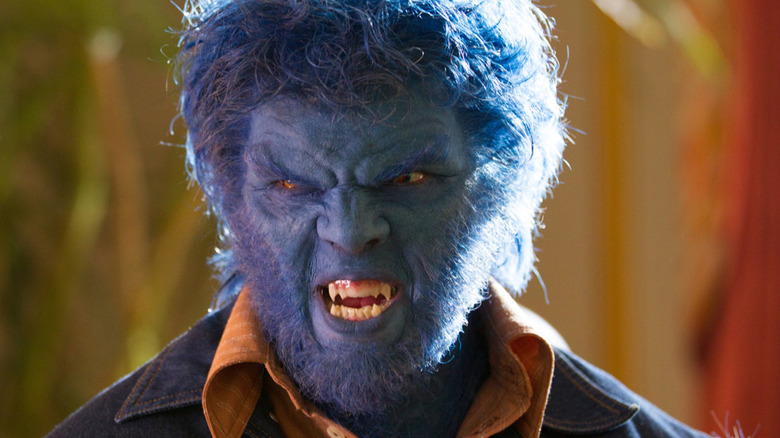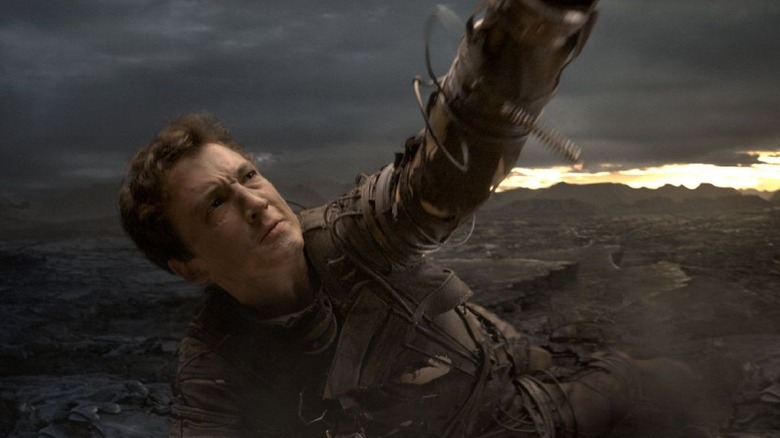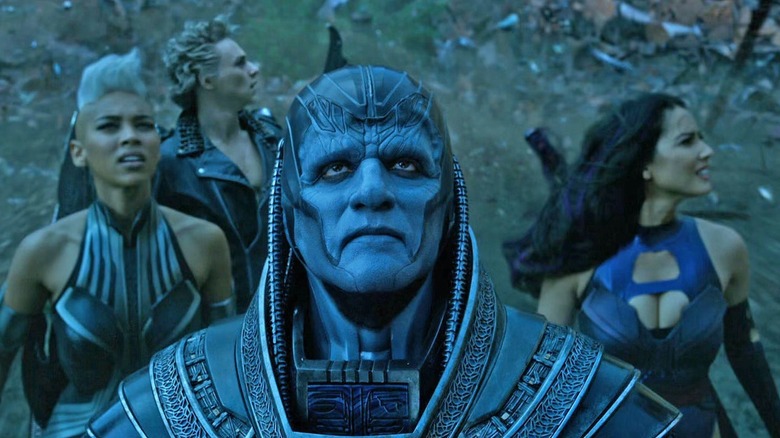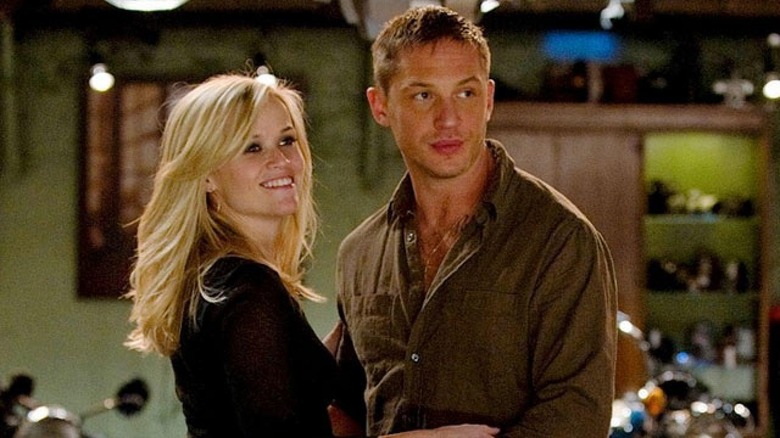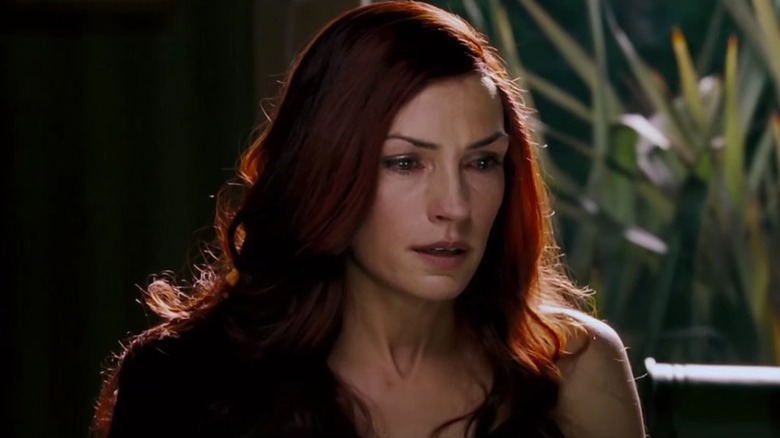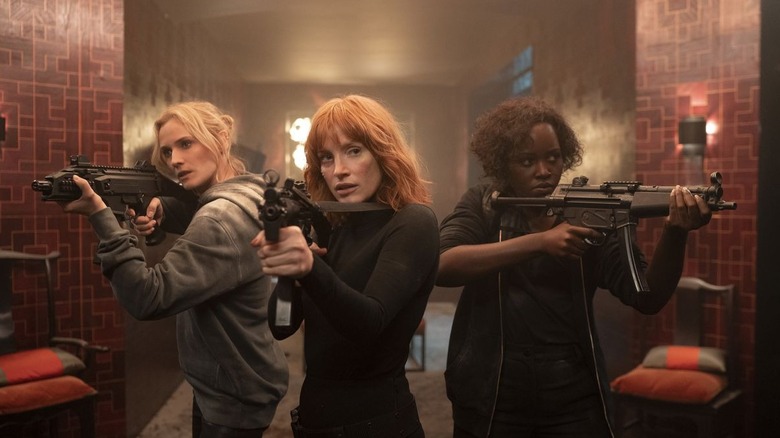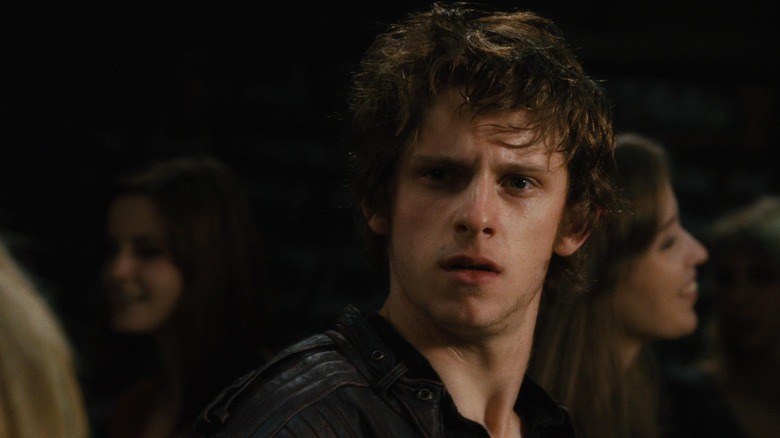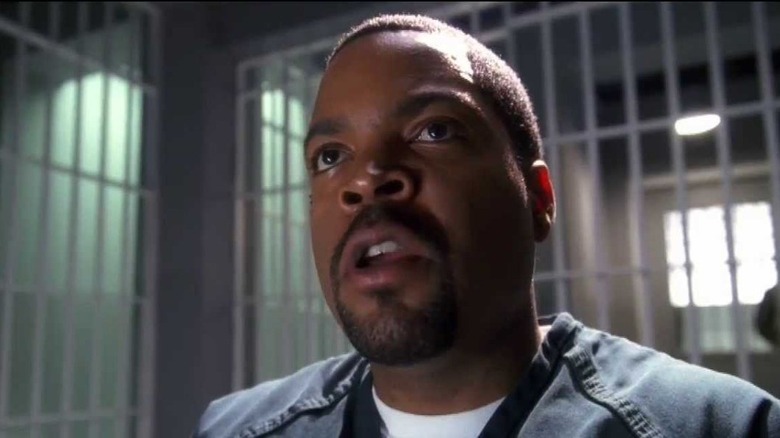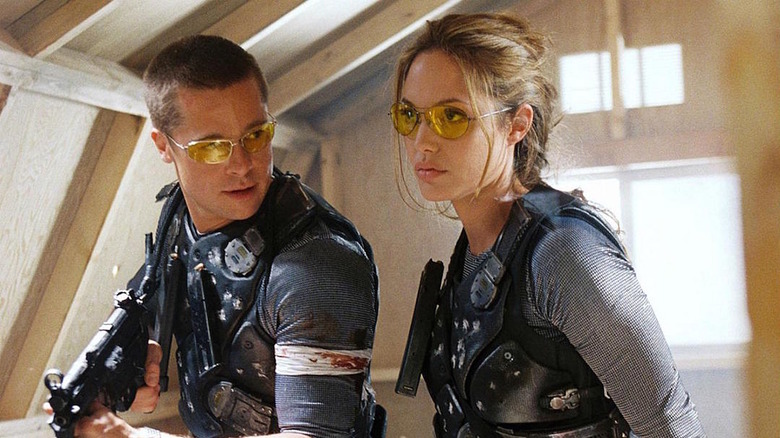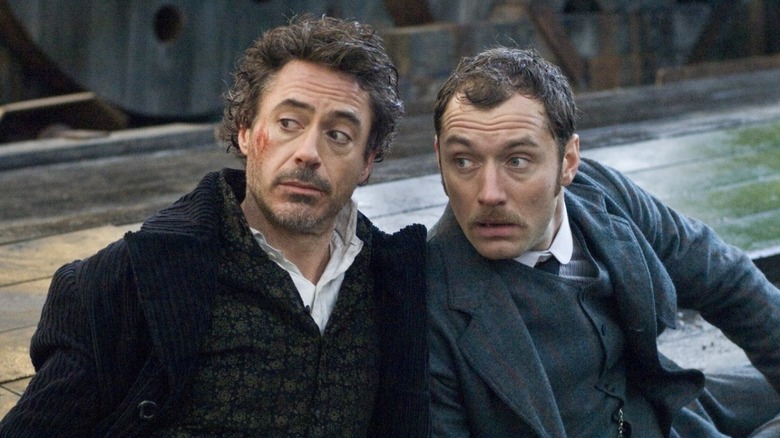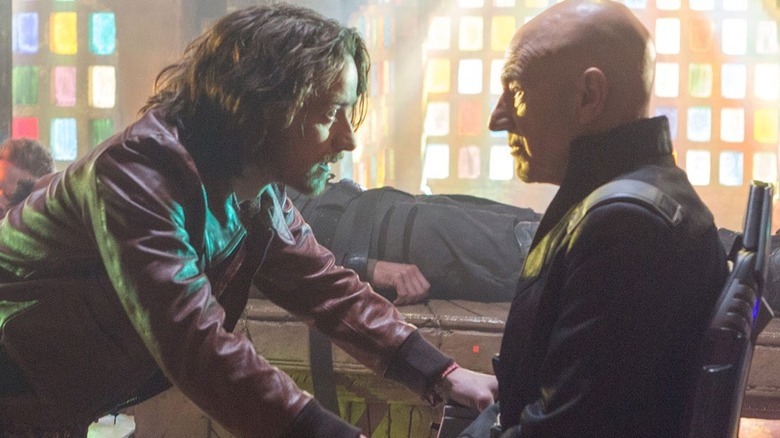Every Simon Kinberg Script, Ranked Worst To Best
A review of Simon Kinberg's "The 355" went viral this past week. Beyond being a scathing critique of the thriller Universal left for dead in theaters, the Letterboxd post was an indictment of Film Twitter's current state, eviscerating the speed with impassioned thirty-something cinephiles like myself will rush to defend 2000's era flops like "Josey & The Pussycats" or "Jennifer's Body." (Both good!) And given that Kinberg was the author of many 2000's era smashes, from his breakout "Mr & Mrs. Smith" to the Robert Downey Jr.-flavored "Sherlock Holmes," it's worth wondering if Nathan Zuckerman's suddenly ubiquitous post has unearthed the skeleton key for both why Simon Kinberg has become loathed by many yet still finds work.
It is impossible to extricate Kinberg from his 2000's come-up. His scripts are time capsules of the aughts' zeitgeist, written to be squarely of their time and even become era-representing. His scripts were brought to life by some of the decade's hottest directors, some of whom have severely depreciated in either artistic esteem or actual public standing. He is a man out of time, a writer whose output has produced some undeniable bangers and strong TV episodes but whose failures pick up the decade's worst cinematic detritus. I'm not going to try and convince you or myself that Simon Kinberg deserves extra love from Film Twitter, but I am going to try and see him more clearly than he sometimes sees his characters.
Here is every Simon Kinberg script, ranked worst to best.
11. X-Men Dark Phoenix
"X-Men: Dark Phoenix" has everything working against it. It's like Norman Stansfield decided Simon Kinberg's directorial debut was "Leon The Professional" and made vein-popping efforts to sabotage the picture's success. For one, it's based on an iconic but extensive comics run by Chris Claremont and John Byrne — it wasn't tailor-made to be a film adaptation, much less an under-two-hour one. But Kinberg did find success translating a different mammoth Claremont & Byrne joint to the big screen, so there was reason to hope he'd also stick the landing here.
He didn't. He really didn't.
The issue with "Dark Phoenix" (apart from Kinberg's writing and directing efforts) is that its story's primary gear is devastation. Without proper nuance, watching Jean Gray break bad and threaten to — or actually — eradicate her loved ones is an absolute drag. For another, Kinberg painted himself into a tight corner in adapting the property because his own "X-Men: The Last Stand" already existed in 20th Century Fox "X-Men" continuity and incorporated Dark Phoenix plot points, leading the British writer-director to axe Wolverine's very important role from the 2019 translation and making Jessica Chastain's Vuk little more than a menacing exposition machine.
But the main reason Kinberg's script for "Dark Phoenix" doesn't work is it presupposes we'll derive fulfillment or pleasure from seeing the X-Men at their worst. And we really don't. "Dark Phoenix" is a tantrum in the place of grief, and one best forgotten.
10. Fantastic Four
You'll notice a pattern or grouping with the initial entries on this list. Taken in tandem, they represent the last decade's most reviled comic book movies — and while mentioning this might feel like Kinberg slander, "Fantastic Four" is an interesting crossroads at which to wonder to what degree Kinberg is actually responsible for these messes.
In the case of Josh Trank's "Fantastic Four," it feels like an example of a writer being mis-hired. Kinberg had a first-look deal with 20th Century Fox (who produced every film written about here so far), one that spanned nearly a decade, so it's clear that he was the apple of someone's eye over there. But beauty is in the eye of the beholder, and anyone who'd analyzed the bulk of Kinberg's work could've told you he was an inspired but very risky choice to rewrite Jeremy Slater's script about Stan Lee's first family.
First, Kinberg has been better at capturing the love which bristles under bickering but functional partnerships more than marital or familial affection. So while one could imagine him capturing the Richards' family squabbles well, that's surely less than half of the equation necessary to make them soar. Second, his script — either due to issues in the editing room or initially imagined choices — makes some absolutely grave calls, including poisonously bad dialogue and abandoning logic entirely in what passes for the film's third act.
This isn't the worst script Kinberg ever penned (because the first act isn't awful!), but it's close.
9. X-Men Apocalypse
"X-Men: Apocalypse" feels like it came out in 2009, but I swear it didn't. Against all odds, the sixth entry in Fox's "X-Men franchise" feels more dated than 2012's "Sucker Punch," 2008's "The Avengers," and even 1995's "Batman Forever." At some point, a dividing line formed between what was new and old hat in superhero cinema, and "Apocalypse" slotted itself on the passé side of that border rather quickly. The film is more humorless than not, more heavy-handed than epic. Its intentions are for as glorious a purpose as Marvel's own Loki once envisioned, but most of its big swings result in massive misses, from the miscasting of Oscar Issac to the film's speedy, then suddenly glacial, pacing.
Kinberg's script, however, isn't as bad as the final product. The creative liberties it takes with Apocalypse make more sense when you remember Josh Brolin's Thanos hadn't hit the screen yet, and that bringing a cosmic villain of grandiose scale to life seemed worth dialing back as much as up. "X-Men: Apocalypse" might be a better film if it were made today, one that could take a clearer approach to its storytelling and hire a different director. But for a film that is all about impending doom, it's ironic that "X-Men: Apocalypse" arrived long after (or before) it had any chance to succeed.
8. This Means War
Blaming the faults of "This Means War" on McG is like saying Matt Ryan cost the 2016 Falcons a Lombardi trophy. In both cases, disaster was a team effort. That said, McG is responsible for the lion's share of why the Chris Pine, Reese Witherspoon, and Tom Hardy top-lined romantic action comedy is so grating.
For one, the action isn't competently shot. Credit to Simon Kinberg: it is competently written. The movie's set pieces, from a mid-date restaurant brawl to a James Bond-parodying opening, could be among the most creative of his career to date if they weren't edited within an inch of their kinesthetic effectiveness. What's more, McG doesn't direct any of his actors to behave like human beings, making Kinberg's admittedly thin characters slender enough to slip through floor cracks.
More than any other script on this list, "This Means War" has a wide gulf from the page to the final product — and it's a cautionary tale that makes one wonder what kind of legitimately charming, pretty good film we might've gotten otherwise.
7. X-Men: The Last Stand
It's tempting (and generous) to describe "X-Men: Dark Phoenix" as an "X-Men: The Last Stand" course correction. Simon Kinberg and 20th Century Fox might've wanted a do-over on Brett Ratner's generally disliked film, which was a major letdown in the wake of both 2000's "X-Men" and 2003's "X-2," but in terms of the screenplay, "X-Men: The Last Stand," is infinitely more interesting and memorable than the flop which followed it.
On paper, "X-Men: The Last Stand" is as heartbreaking and morose an end to a trilogy of movies as this century's produced. It leaves many of the series' protagonists dead and frames acts of heroism as unbelievably traumatizing experiences (particularly for Wolverine). In some ways, such a conclusion anticipates what writer Jonathan Hickman would explore in his revelatory "House" and "Powers of X" series — a world in which mutants decide they're done taking the derision of a world which has served them tragedy after tragedy after bigotry-fueled tragedy.
Sadly, the movie which brings these themes to life can't contain them. "X-Men: The Last Stand" is a cinematic mess that contains a few genuinely fun sequences and lines (the Golden Gate bridge attack, "I'm the Juggernaut, b****!"), but gets stuck in one tonal gear for much of its runtime. It was the first (and certainly not the last) time Simon Kinberg came close to writing a good X-Men film, but didn't quite get there.
6. The 355
Is it possible that Simon Kinberg shouldn't direct his own scripts? "The 355" makes a compelling case for the affirmative. That's less of a criticism of the recently released action film than it may sound, given that "The 355" features some pleasingly staged action sequences and character beats. The question is if those beats and action sequences Kinberg scripted are appropriately served by his direction. It can be a mistake to assume a writer knows what the tone of their own work should be.
Take this moment from "The 355:" The sequence wherein a hard drive that can hack any market or self-destruct any plane in the sky sells for $500 million. If, upon hearing this, your thought was "Only 500 million?!," that's appropriate! This is incredibly funny, as is the moment when Jessica Chastain gets misty-eyed for the moral clarity of the War on Terror, or when she hits a cow with her car while out on assignment. (Queasy, yes. Funny? Also yes.)
My point is that Simon Kinberg scripts have a chance at not yielding cinematic deadweight when they're in on the jokes they're serving up. His best work, from "XXX: State of The Union" to "X-Men: Days of Future Past," pauses to actually let comedy land. Not so with "The 355." As written, it's a solid action film about female operatives who are tired of being pawns in the counterterrorism games of men. As put to screen, it approaches "Girlboss: The Action Picture" with pretty solid action. Let Cate Shorland remake it.
5. Jumper
Doug Liman and Simon Kinberg don't necessarily bring out the best in each other, but there's zero doubt their collaboration is combustible: The pair's "Mr. & Mrs. Smith" is still a millennial cultural hallmark (not only for the Brangelina saga it catalyzed), and there's also "Jumper," a maligned sci-fi-action hybrid that scored 15% on Rotten Tomatoes and doesn't boast many defenders. I'm not exactly one of them.
I am, however, here to argue that "Jumper" is both better than you remember and an impressively efficient adaptation of Steven Gould's 1992 YA novel. Kinberg is tasked with creating a movie that both works and sets up the next major 20th Century Fox franchise (in 2007, the studio released "The Simpsons," "Die Hard," "Night At The Museum," and "Alvin & The Chipmunks" movies, all of which were Top 20 hits). By my metric, he succeeds. "Jumper" globe-hops from New York penthouses to ancient ruins, flips between close combat thriller and teen movie, and switches up its storytelling approaches with almost every concurrent scene. It works better on paper than in execution, but the paper part's all Kinberg.
Look to Jamie Bell for proof. Bell embodies Kinberg's snarky but sincere ethos and has the acting talent to make it all more genuine than grating. Had the cast matched him beat for beat (Hayden Christiansen and Rachel Bilson are out of their element here), we might remember "Jumper" a bit more fondly.
4. XXX: State of The Union
Simon Kinberg's sequel to "XXX," a movie in which Vin Diesel growled "Stop thinking Prague police and start thinking PlayStation," begins on a tranquil horse farm. That is objectively excellent. Even more excellent? That horse farm is just a front for a sleek, futuristic NSA base under attack by CGI drones and run by Samuel Jackson, double-wielding pistols. The fact that "XXX: State of The Union" veers from the knowingly stupid to actually stupid to "God, this is stupid, I love it" is a testament to the Saturday morning serial Kinberg and "Die Another Day" director Lee Tamahori crafted here.
Full confession: I grin like an idiot every time I see "XXX: State of The Union;" it's the kind of movie my friends and I would've tried to dream up when we were in grade school — and that's exactly how it's written, performed, and directed. Kinberg (whose treatment was selected over another, completed script) goes to town like a child in a sandbox, putting Ice Cube against corrupt government officials while he blows up the Capitol with a rocket launcher and quotes 2Pac. Yes. All these things happen in "XXX: State of The Union." They're bad. They're great. Give Simon Kinberg his due for this one.
3. Mr. & Mrs. Smith
The term "cultural reset" gets bandied about too often, but it absolutely applies to Doug Liman's sensational "Mr. and Mrs. Smith." The end of Brad and Jennifer is the beginning of Brangelina — an event that starts on the "Mr. and Mrs. Smith" set. Liman's film cements his A-list studio status and almost certainly earns Kinberg his shot at writing four separate franchise films. That's a cultural reset, too. The question is whether, after 17 years, "Mr. And Mrs. Smith" is still worthy of the ripples it caused.
The answer is yes. Because while Kinberg's work gets an all-time power boost from the high-wattage chemistry of Pitt and Jolie, his script gives them ample opportunity to crackle. Were it the product of a more nuanced cinematic moment than the loud early aughts, you could argue that "Mr. And Mrs. Smith" puts its characters first and action second in its efforts to elucidate how a marriage can regain the spark it never technically lost (and, for what it's worth, Kinberg and Liman's failed TV pilot of "Mr. And Mrs. Smith" doesn't itself get the balance right, making this feature feel even more like lightning in a bottle). Just because it offers mostly pop psychology doesn't mean that said insights aren't genuine cornerstones for the audience which still remembers it fondly.
A cultural reset, indeed.
2. Sherlock Holmes
A partnership is defined as "an arrangement where parties, known as business partners, agree to cooperate to advance their mutual interests." Given that, it's little wonder that some couples call themselves partners. Love is a grand mutual interest — so, too, are building a home and intimacy and bettering oneself through growth catalyzed by knowing someone at a bone-deep level, by letting them know you back.
There is zero question that the Sherlock Holmes and Watson of Guy Ritchie's "Sherlock Holmes" know each other down to the marrow. That knowledge confounds, infuriates, and ultimately saves them throughout Ritchie's smash action-mystery hybrid, which transports all the best and hyper-modern elements of Simon Kinberg's work to Victorian England. There's the knack for crackling dialogue. There's the proclivity for imaginative set pieces, from Sherlock's inner-monologue-driven boxing to the frenetic opening chase scene. It's all a bit much, but almost ruthlessly charming, too.
In some ways, "Sherlock Holmes" unlocks the key to making a Kinberg script soar: Anachronisms. Comic book movies can be full of them. "Mr. & Mrs. Smith" was sold as a hybrid of hot, romantic comedy and blockbuster spectacle. Nothing about 2009's "Sherlock Holmes" is really Sherlock Holmes as Arthur Conan Doyle imagined, but the fact that it isn't is what makes Kinberg the right guy to pen it. He reimagines "Sherlock Holmes" as a port of his own most successful work. Ritchie lets him soar.
Sounds like a solid partnership.
1. X-Men: Days of Future Past
There is a marvel to the organization of continuity that's not to be underestimated. We live in a post-time era; according to Katherine Miller, the 2010s broke our entire sense of it, bent it to the shape of social media platforms, breaking news items, and algorithms more than sunrises. Modern life is mostly a jumble. So when someone makes sense of it, be it through decoding Wordle or tracking Elmo's gaslighting, we are awash in relief and joy. Witness "Spider-Man: No Way Home," which took 21 years of Webhead cinema and fandom and convinced us none of it was for naught, that all of it mattered. Continuity can be a gift.
Eight years removed from its release, "X-Men: Days of Future Past" is a gift that keeps on giving. It feels strangely prescient, anticipating both Sony's multiversal Spider-Man experiment and Marvel's propensity for surprise character cameos. It's marvelously assembled. Best of all (at least for the purposes of this article), it's impeccably written. Working from a story by Jane Goldman and Matthew Vaughn, Kinberg juggles tone and character voice with ease, greasing the plot's labyrinth tale with economical dialogue and mischief that gives way to gravitas. You need only look to Evan Peters' Quicksilver to see how successfully those tactics manifest. When the character's generally sardonic nature gives way to the glib yet awe-inspiring action sequence set to Jim Croce's "Time In A Bottle," Kinberg's work literally makes clear that time is a marvel and that time matters. It's the most lasting gift of his career to date.
